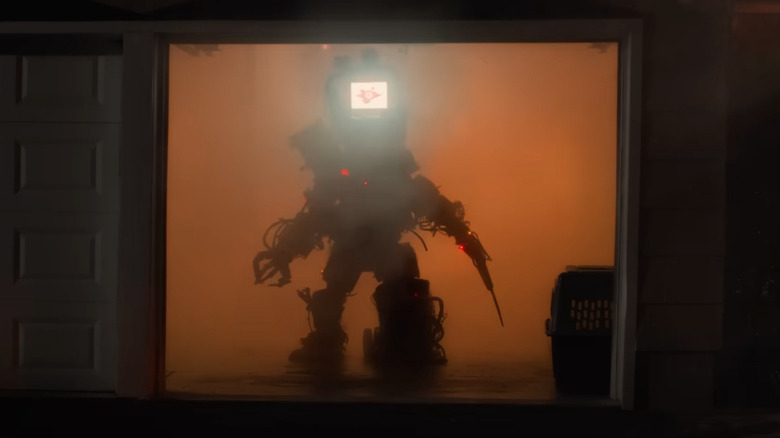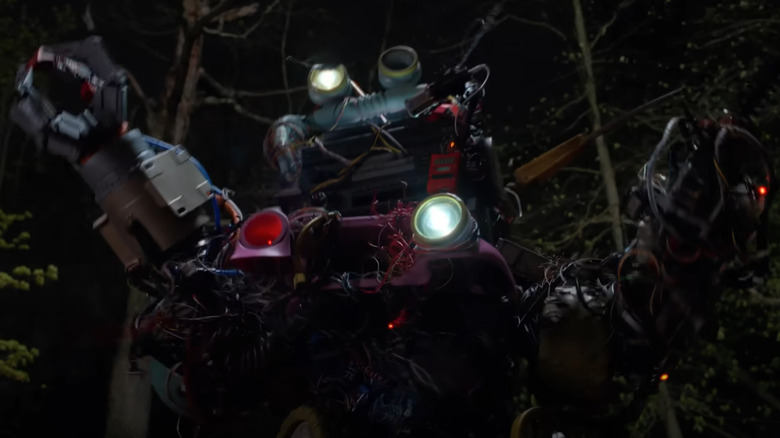Kyle Mooney's Y2K Features The Heaviest Practical Effects Suit Weta Has Ever Made For A Movie
Kyle Mooney's new movie "Y2K" delivers a sci-fi horror concept that is so stunningly simple that you won't believe that no one's taken advantage of it on this scale until now. It's New Year's Eve on 1999, and a big high school party is about to be interrupted by the sudden appearance of techno monsters formed by the timely technology of the time, ranging from big tube TVs and computer monitors to Jeep Power Wheels and VCRs. They're all controlled by a computer hive-mind that intends to turn humans into microchip-controlled drones who will do their bidding.
While Jaeden Martell (the recent "IT" movies), Julian Dennison ("Deadpool 2" and "Hunt for the Wilderpeople") and Rachel Zegler (Steven Spielberg's vibrant "West Side Story") are the stars of this film who face this darkly hilarious techno apocalypse, don't sleep on the incredible practical effects from Wētā Workshop that bring these creatures to life. The special effects masters were able to realize the vision director Kyle Mooney (of "Saturday Night Live" fame) and co-writer/producer Evan Winter had in mind, right down to the real TV and computer monitor displays built in to the creatures themselves.
Leading up to the release of "Y2K," we spoke with Mooney and Winter about working with Wētā Workshop in bringing these monsters to life on camera, where we learned one of the creations actually pushed the special effects workshop to new heights.
'I think they told us that the larger creature was the heaviest practical suit they've ever built...'
When it came to the look of the techno creatures, Mooney and Winter knew what they wanted from the beginning. Mooney explained:
"It was something Evan and I talked about pretty early on in terms of conceptualizing this thing. We've always wanted this to feel like a movie made from the era, and so it made a lot of sense to go practical whenever we could. We were really fortunate to work with Wētā [Workshop], and what's so amazing about them, we had pretty decent ideas of where we wanted to land on how these creatures looked, but truly, their first round of conceptual art was so close, I think, to what we had in our head. It's rare that you find yourself in these situations where you're working with collaborators who can not only sync into your vision but also add something completely awesome to it. So we were psyched with that whole process."
Winter echoed those sentiments and talked about the actual process of making the practical suits that were worn by stunt performers:
"It was incredible. It was probably almost a year. We started working with them so soon after we got the go to make the movie, and it was probably the better part of a year developing the designs, landing on it, and then they start fabricating and they start sending us test videos. They would make cardboard cutout silhouettes so they can be like, 'This is what it'll look like. This is the size compared to a normal person.'"
Of course, when you're building practical effects like this, there are also challenges that they bring to the production. Winter recalled:
"I think they told us that the larger creature was the heaviest practical suit they've ever built for a single person that isn't being assisted by puppeteers, and just the way to distribute the weight, to make those screens work practically, emit light so that we can interact with our performers on set. Inside, they have controls, claws and different joysticks that can move other elements, and just the logistics of how to make all of that work while simultaneously allowing the performers to be able to be in those suits and work for hours, it's such a needle to thread. That was incredible to see it all come together."
You can see these incredible practical effects in "Y2K," which is playing in theaters everywhere now, and you can listen to more of our chat with Mooney and Winter, as well as stars Jaeden Martell and Julian Dennison, on this episode of the /Film Daily Podcast:
You can subscribe to /Film Daily on Apple Podcasts, Overcast, Spotify, or wherever you get your podcasts, and send your feedback, questions, comments, concerns, and mailbag topics to us at bpearson@slashfilm.com. Please leave your name and general geographic location in case we mention your e-mail on the air.

